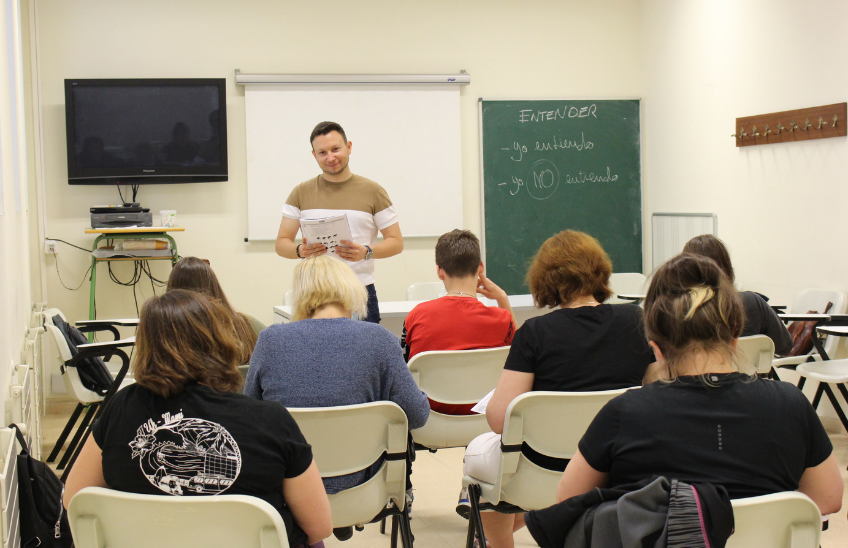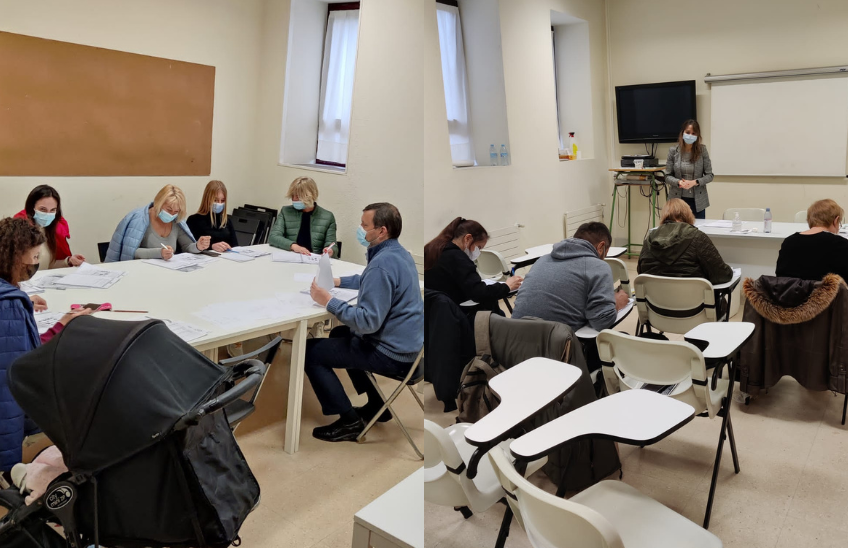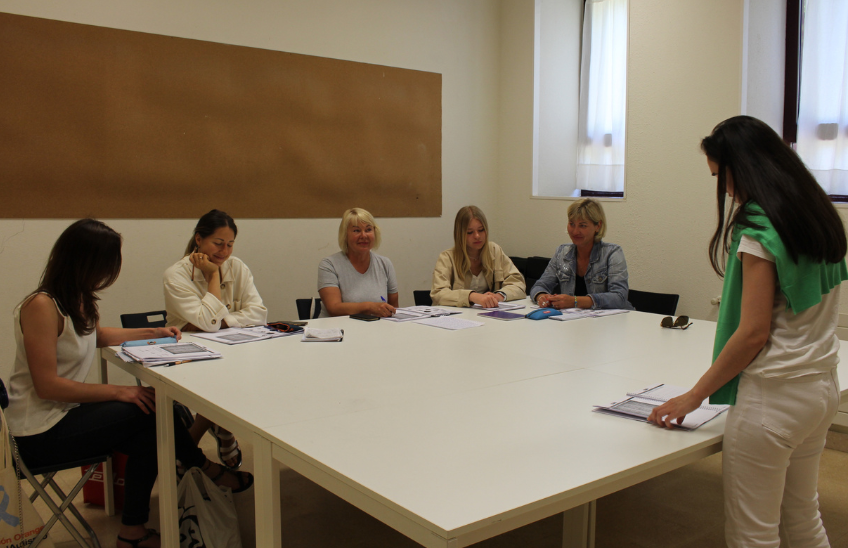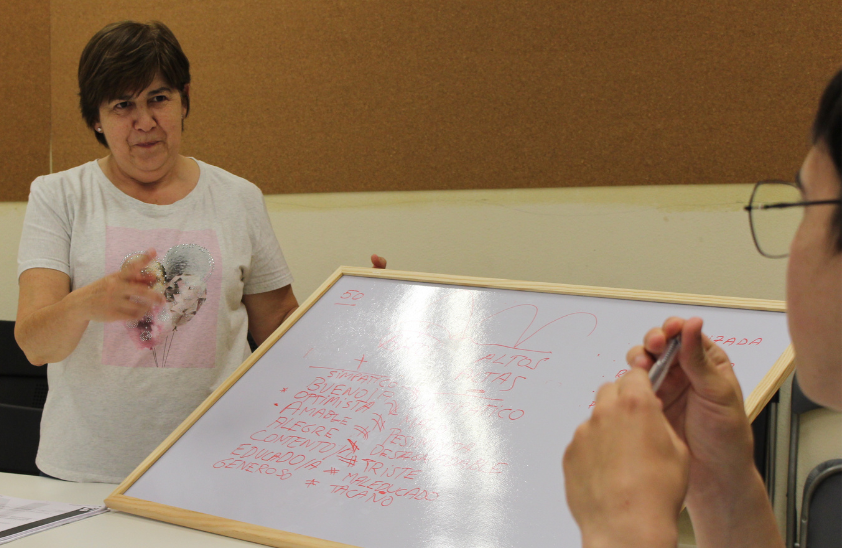News
LATEST NEWS AND EVENTS FROM THE SCHOOL OF ENGINEERING
Eleven volunteers and 30 Ukrainian students in Tantaka's Spanish class program.
Volunteers at Tecnun tell of their experience 88 days later

PhotoPaulaBerroa/Dmytro Hlukhov, PhD student Ukrainian and project volunteer, teaches the term "understand" to students.
13 | 06 | 2022
88 days ago, about fifteen Ukrainians arrived at Tecnun to learn Spanish. Among them, five children, a man from Uzbekistan with his wife, a 17-year-old teenager and a dozen women ranging in age from 19 to 70.
Dmytro Hlukhov, student PhD from Tecnun and a Ukrainian volunteer with the Vostok Lira group, saw a great need for them to learn Spanish. "They had been here for 10 days and once the stress of the trip had passed and they were calmer, I thought: 'So, what now? We have to do something, we can't and can't stand still," he says.
He contacted Tantaka-Tecnun, the School's Solidarity Time Bank, and in two days a team of volunteers set up a program of classes. The first shot of contact took place on a March 18 at Degrees 's classroom from Tecnun. "It made my heart skip a beat when that day, during the presentations, I heard a woman say that she worked in banking like me, because I thought it could very well be me on the other side," reflects Ana Arrondo, mother of a student from Tecnun.
Dmytro Hlukhov, known as Dima, has been the translator from the first day. He welcomed them and explained the methodology of the course and that the activity would take place in the premises of the Holy Spirit Parish on Monday and Wednesday afternoons. They met their teachers: the teachers of Tecnun Adam Podhorski, Ainhoa Rezola and Paz Morer, the aforementioned Ana Arrondo, the 3rd year student Lara Zamora and Silvina, who got to know the project through Soledad Abad, responsible for Alumni at Tecnun.
The main difficulty, Hlukhov explains, is that "from the very beginning we knew we had to reduce the material from one year to five months because many would probably want to go back to their country or find a job and have to leave the classes". The goal of the course is to give them tools to get by on the street, which the PhD student calls "a survival language" that sometimes forces volunteers to skip concepts and ask them to study them on their own.
A teacher with experience in teaching Spanish to foreigners recommended that they use the guide "Tejiendo el español del nivel A 1". With the book as guide, each week the volunteers prepare their class and note where they have left off for the next person to continue. From the beginning, a natural division of the groups emerged. Those with the highest level went with Paz Morer and Adam Podhorski and Ana Arrondo and Ainhoa Rezola took on the lower level group. Lara Zamora and Silvina had to adapt the classes for the youngest children, opting for games and drawings to begin teaching them about colors, parts of the human body and numbers.

Zamora, like the rest of the volunteers, acknowledges that "obviously I had never given classes to people who have no idea about language". But instead of getting stuck and thinking that it was going to be a "big problem" she opted to put "more love, more creativity and more effort into it so that these children would see that we were really going to welcome them" . She spoke with her childhood school in Barcelona, with the city schools Eskibel and Erain and with the senior schools Jaizkibel and Ayete asking for financial aid, and got all subject of books, pens, paints, pencil cases and notebooks with which to move forward with the classes.
"One day they came and told me the numbers up to 120 and I thought: what a level, what a desire to learn". Being with them, he says, has been incredible and one of the most beautiful experiences of his life. "I have grown. I've seen that they are people who don't have a home, who have their parents away, but I wish many of us had the joy and the smile on our faces", she reflects. "I got goose bumps when they sang the Ukrainian anthem almost with their hands on their hearts, or when I told them to pick any colour they wanted and they chose blue and yellow. You can feel what these children are going through. Maybe they are not so aware of the political conflict, but who is not aware that they no longer have a home," he continues.

Arrondo recalls that she started project because of her love for languages "without knowing what she was going to find, but with the great illusion of supplying a need in some people and helping them to be a little self-sufficient". For her, each week is more exciting and she sees that she is "settled".
There are people who are always there, but some miss out due to work or have returned to Ukraine. Others, however, have joined in and what started with 15 students has grown to 30 and eleven volunteers as the course has progressed. Word of mouth has brought in new Ukrainian members, either through Tantaka by people who have Ukrainians in foster care and call Tecnun, or through the Vostok Lira group, with "Dima" as an interlocutor.
Arrondo highlights the commitment and gratitude of all of them even though there are many "things behind" that the volunteers never get to know. "They are people who may already be tired or frustrated, but if they get involved, they get involved. That's why I don't mind repeating and repeating concepts," he acknowledges. "There are two, for example, who are cooks by profession and, although they have some dense conference , they come in their three hours off."

Although the most difficult thing is still that there is no vehicular language because they do not know English or Spanish, the volunteers see progress. Progress and willingness in people who, even at the age of 60, have been forced to learn language from scratch. For their part, the students smile when they are asked about the organization of the course and about the "grade" they would rate their teachers from 1 to 10. Laughing, and showing that they understand more than they speak, they give their teachers a score of 12.
"We've become a family, a family of friends. And you realise that when you decide to be a volunteer you commit yourself to everything, you accept a series of things because there are people who are depending on you. And if you are there, you have to be one hundred percent and not half-hearted, and even less so in such a delicate matter in which you are offering your time, which is the most valuable thing we have", concludes the student.
